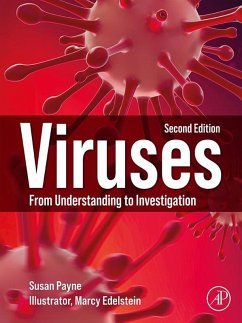Viruses: From Understanding to Investigation, Second Edition presents the definitions and unique characteristics of viruses. The book includes major topics such as virus lifecycle, structure, taxonomy, evolution, history, host-virus interactions, and methods to study. In addition, the book assesses the connections between the aforementioned topics and provides an integrated approach and in-depth understanding of how viruses work. The new edition also provides an expanded methods chapter containing new information on deep sequencing for in virus identification, mathematical formulas to calculate titers and a description of quantitiative PCR for enumerating viruses. The vaccine chapter has been updated to include vaccine efficacy, mRNA vaccines and SARS-CoV-2 vaccine development. The viral pathogenesis chapter has been expanded to include mechanisms of virally induced cancers. Viral taxonomy sections have been updated and chapters revised to accommodate new virus family designations. New chapters include nucleocytoplasmic viruses (very large DNA viruses), replication of viroids and COVID-19/SARS-CoV-2.
- Employs a comparative strategy to emphasize unique structural and molecular characteristics that inform transmission, disease processes, vaccine strategies, and host responses
- Presents a review of host cell, molecular biology, and the immune system
- Features topical areas of research, including genomics in virus discovery, the virome, and beneficial interactions between viruses and their hosts
- Includes text boxes throughout with experimental approaches used by virologists
- Covers learning objectives in each chapter
Dieser Download kann aus rechtlichen Gründen nur mit Rechnungsadresse in A, B, BG, CY, CZ, D, DK, EW, E, FIN, F, GR, HR, H, IRL, I, LT, L, LR, M, NL, PL, P, R, S, SLO, SK ausgeliefert werden.

